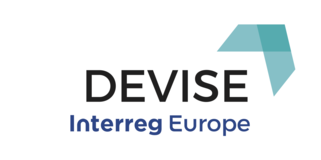Interreg Europe has awarded the DEVISE partnership with an extension of 12 extra months to complete some additional activities that will contribute to the improvement of the policy instruments addressed by the project partners and to develop new learning experiences in the context of COVID-19.
The improvement expected in most of the cases comes in the form of implementation of new projects. ERNACT (Ireland), Cantabrian Government (Spain), Fomento San Sebastian (Spain), Seinäjoki University of Applied Sciences (Finland), Derry City and Strabane District Council (Northern Ireland) and Voka – Chamber of Commerce of West Flanders (Belgium) will be addressing the original policy instruments and the improvements expected are as follows:
- ERNACT addresses the Donegal Digital Action Plan, in particular Action 2: Digital Innovation – Connecting talent. The work will focus on finding new ways to provide remote support and collaboration environments for the digital transformation of SMEs.
- Cantabrian Government will use the work for the implementation of two different strategies included under the REACT EU programme from the Cantabrian Regional Operational Programme 2014-2020: Digitalisation of companies, specially SMEs, and Development of different support schemes for the digitalisation and innovation of the regional companies.
- Fomento San Sebastian is still addressing the local policy instrument: ‘Strategic Plan San Sebastian 2020’, and more concretely its objective 7. The work will be a very useful learning tool to identify relevant and effective good practices dealing with COVID-19 disruption, that inspire the launch of new and better adapted local programmes.
- Seinäjoki University of Applied Sciences will continue contributing to ‘Investment Priority 2: To increase companies’ competitiveness through a new kind of product development’ and S3 ‘Smart and energy efficient systems’ of the Regional Strategy of South Ostrobothnia. Projects planned will support the adoption of new technologies and adaptation and development of new innovative solutions into companies.
- Derry City and Strabane District Council will continue addressing the 2014-20 Northern Ireland ERDF Investment for Growth and Jobs Programme - Priority Axis 2: Enhancing the competitiveness of small and medium-sized enterprises. The additional activities will serve to enhance the Competitiveness of SMEs through the Local Economic Development measure, mainly the creation of jobs through influencing support to enhance the economy post COVID-19.
- Voka – Chamber of Commerce of West Flanders will use the work for the implementation of new projects for the digitalisation of SMEs under the REACT EU programme from the Operational Program 'Investment in Growth and Jobs' Flanders 2014-2020.
Nevertheless, Northern and Western Regional Assembly (Ireland), Regional Development Agency of West Romania, Business Agency Association (Bulgaria) and Laval Mayenne Technopole (France) are addressing new policy instruments:
- Northern and Western Regional Assembly will focus on the ‘Regional Operational Programme for the Northern and Western Region 2021-2027’ to influence the development and implementation of the next Regional Operational Programme for the EU programming period 2021 – 2027.
- Regional Development Agency of West Romania is now addressing the ‘Regional Operational Programme of West Region 2021-2027’, which contains three main priorities: develop the innovation ecosystem oof the West Region, boost growth of SMEs competitiveness and the adoption and integration of digital technologies in both economy and public sector.
- Business Agency Association is participating in the working group of consultations for the elaboration of the ‘Program for competitiveness and innovation in enterprises 2021-2027 (PCIE)’. This programme aims at achieving intelligent and sustainable growth of the Bulgarian economy, as well as the implementation of industrial and digital transformation.
- Laval Mayenne Technopole addresses now the ‘Regional programme ERDF-ESF+ Pays de la Loire 2021-2027’, based on regional strategies and plans and has been enriched thanks to contributions from regional partners and recommendations from French Government and the European Commission.
The additional activities will take place over one year. During the first semester, the exchange of experience process will be based in the following activities: COVID-19 Regional context assessments in relation to digital transformation of targeted SMEs; COVID 19 good practices package production; an online thematic workshop; regional stakeholder group meetings and interaction with the Policy Learning Platform and other Interreg Europe funded projects.
Regarding the second semester, another two thematic workshops will be organised, more regional stakeholder group meetings will be held whereas the interaction with other projects and the Policy Learning Platform will continue.
Stay tuned!











